Kobiton Review – Mobile Testing Platform with Real Devices
In this Kobiton review, we will explore what Kobiton is, highlight its features, and discuss how it can enhance your mobile testing journey.
As a senior QA with years of experience in mobile testing tools, I have had the opportunity to explore a myriad of solutions aimed at enhancing the efficiency and effectiveness of mobile app testing. Among these, Kobiton stands out for its robust features and user-friendly interface. Designed to accelerate the testing process and ensure high-quality mobile applications, Kobiton provides a comprehensive platform that supports manual and automated testing across real devices and emulators.
No more Emulators. Yes, you can run your tests on real devices. You can perform all the gestures you need to test on a real device. Tap, swipe, and scroll on a cloud device, simply and naturally.
In this Kobiton Tool Review, we are going to see the following

Kobiton Mobile First Platform Introduction
Kobiton is a cloud platform for executing automated and manual mobile and web tests. Kobiton supports running automated tests with Selenium WebDriver (for web applications) and Appium (for native and mobile web applications).
You can test your websites with your favorite language – no need to learn specific scripting languages or learn a new programming language. In addition, you also don’t need to install testing SDKs and even the Appium binding can be a pain point for test and dev team. When you run Appium in the cloud, there is no need to install Appium and set up your devices. You’ll have access to test on hundreds of browsers instantly.
Today, I’ll walk you through a basic example of how to use Appium / Selenium for mobile cross-browser testing using real Android and iOS devices and real web browsers on these platforms on Kobiton Cloud.
Kobiton Features
- Comprehensive Device Lab Management: Kobiton Device Lab Management is an advanced feature designed to streamline the testing process by offering efficient management of a wide range of real devices. Kobiton offers several platform options for device lab management, including on-premises, cloud and hybrid. This feature enables users to access multiple devices remotely, facilitating both manual and automated testing. It ensures comprehensive app compatibility across different devices and operating system versions, significantly minimizing the occurrence of device-specific issues. Users can manage device availability, schedule testing sessions, and monitor device health, all from a centralized interface. This not only improves testing efficiency but also allows for better resource utilization and makes it easier to maintain a high standard of app quality.
- Real-Device Testing: Unlike emulators or simulators, real-device testing ensures that your applications are tested in conditions that closely emulate the actual user environment. Kobiton allows you to test on a wide range of real devices, providing accurate feedback on device performance, user interactions, and network conditions.
- Parallel Testing: Kobiton’s Parallel Test Execution feature allows you to run multiple tests at the same time on various devices. This helps you save time and quickly identify issues. Whether you are conducting manual tests or automated ones, parallel testing speeds up the process by testing different scenarios simultaneously. This way, you can efficiently ensure that your app works well across multiple devices and operating systems.
- Scriptless Automation: For teams without extensive coding expertise, Kobiton offers scriptless automation capabilities. This feature enables you to create automated test cases using a simple, intuitive interface, making automation accessible to all team members regardless of their technical background.
- Seamless Appium and Selenium Integration: Kobiton supports popular testing frameworks like Appium and Selenium, allowing you to leverage existing scripts and workflows. This enables a smooth transition and integration into your current testing processes without the need for extensive modifications.
- AI Powered Visual Testing: Kobiton’s AI Powered Visual Testing for mobile applications feature automatically identifies visual bugs in your applications. It uses advanced algorithms to detect UI inconsistencies and ensures that your app’s appearance remains consistent across different devices and screens. This helps you maintain a polished and professional user experience without extensive manual checking.
- AI-Augmented Testing: Kobiton’s AI-Augmented Testing uses artificial intelligence to make mobile app testing faster by automating routine tasks. It automatically identifies issues, suggests improvements, and enhances test coverage without needing extensive manual intervention. This helps ensure apps work well on various devices, saving time and effort for developers and testers.
- Mobile Test Management: Kobiton’s Mobile Test Management is a centralized platform that streamlines testing processes and improves app quality by allowing developers and testers to manage test suites, runs, and cases across multiple devices.
- Integration with CI/CD Tools: Kobiton makes it easy to connect with popular CI/CD tools. This helps your development process run more smoothly. With Kobiton, you can test your apps on real devices quickly and efficiently. Some of the tools that integrate easily with Kobiton include Jenkins, HockeyApp, JIRA and more.
Pros and Cons of Kobiton Mobile Testing Platform
Pros
- Real Device Testing: Kobiton allows users to test on real devices, giving more accurate results than emulators or simulators.
- Device Availability: With a wide range of devices available in the cloud, users can test on many device types and configurations.
- Scriptless Automation: Allows even those without coding knowledge to automate tests, making the platform accessible to all team members.
- Integration: Seamlessly integrates with popular CI/CD tools, enabling continuous testing and development.
- Performance Insights: Provides detailed insights into application performance, helping to identify and resolve issues quickly.
- User-Friendly Interface: The platform has an intuitive and easy-to-navigate interface, making it simple to use.
- Cost-Efficiency: Reduces the need for maintaining physical device labs, cutting costs for teams and organizations.
Cons
- Learning Curve: Despite its user-friendly interface, some users may still face a learning curve when starting with the platform and facing difficulties to capture screenshots within the application.
- Performance on Large Projects: Users have noted that performance can sometimes lag when dealing with large-scale projects.
- Limited Customization: Some users find the customization options for test environments to be limited compared to other tools.
- Dependency on Internet: As a cloud-based platform, a stable internet connection is necessary for proper functioning, which might be a limitation in low connectivity areas.
- Pricing: While cost-effective for some, smaller teams or startups might find the pricing plans relatively expensive.
- Support Response Time: Some users have experienced longer response times from support, which can delay troubleshooting and issue resolution.
Kobiton Pricing
You need to contact Kobiton for pricing. Use this for Kobiton free trial.
Expert Opinion on Kobiton Mobile Testing Platform
As an experienced software QA, I find Kobiton to be a powerful mobile testing platform that meets many of the core needs of modern testing teams. Its ability to offer real device testing is a major advantage, ensuring that our tests reflect real-world usage conditions. The platform is user-friendly, which makes it accessible to both new and experienced testers. However, it’s important to acknowledge certain limitations.
Firstly, while Kobiton’s interface is intuitive, there is still a learning curve, particularly for those unfamiliar with mobile testing platforms. The performance can sometimes become sluggish when handling large-scale projects, which may affect productivity. Additionally, the customization options for test environments are somewhat limited, which can be a drawback for highly tailored testing requirements.
The dependence on a stable internet connection due to its cloud-based nature can pose challenges in low connectivity areas. Moreover, the cost can be a concern for smaller teams or startups, as some of the pricing plans might seem steep. Lastly, there have been instances where the support response time is slower than expected, which can delay troubleshooting.
Despite these challenges, Kobiton remains a robust option for mobile testing, offering a comprehensive array of tools and functionalities that cater to a wide range of testing scenarios. For teams that can work within its limitations, it provides significant value and efficiency in the mobile testing process.
Kobiton Tool Registration
We need to register to start working with Kobiton Tool. So let’s move ahead to create a free trial account and sign in. It takes just a few moments.
Step 1: Go to official website of Kobiton to create a free account on Kobiton account
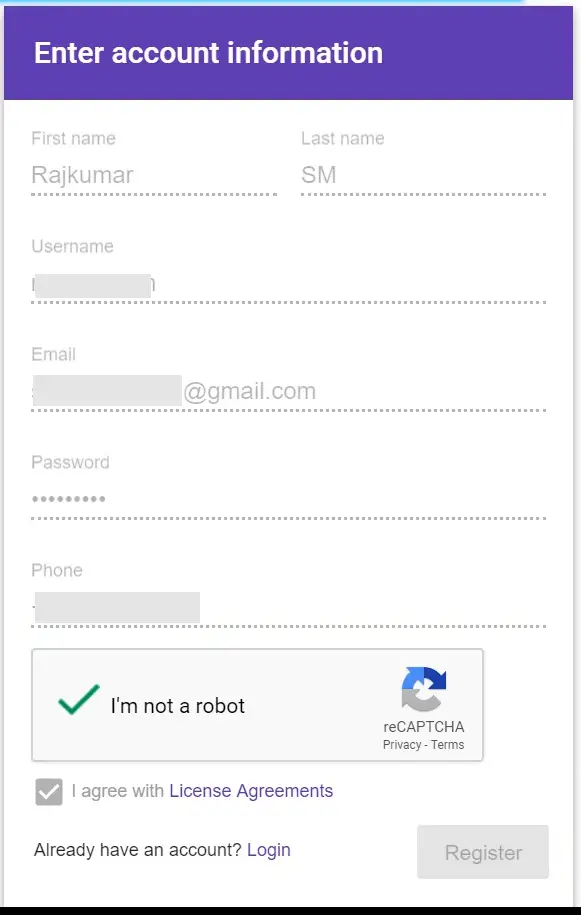
Step 2: Enter your login credentials (such as ‘Email’ and ‘Password’) and click on ‘Log in’
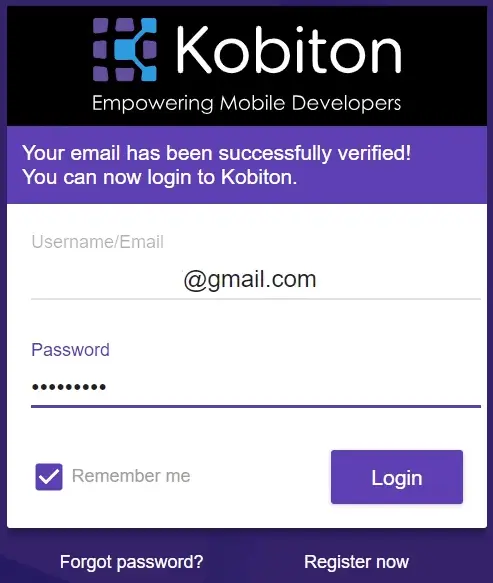
You will be redirected to your devices page of Kobiton.
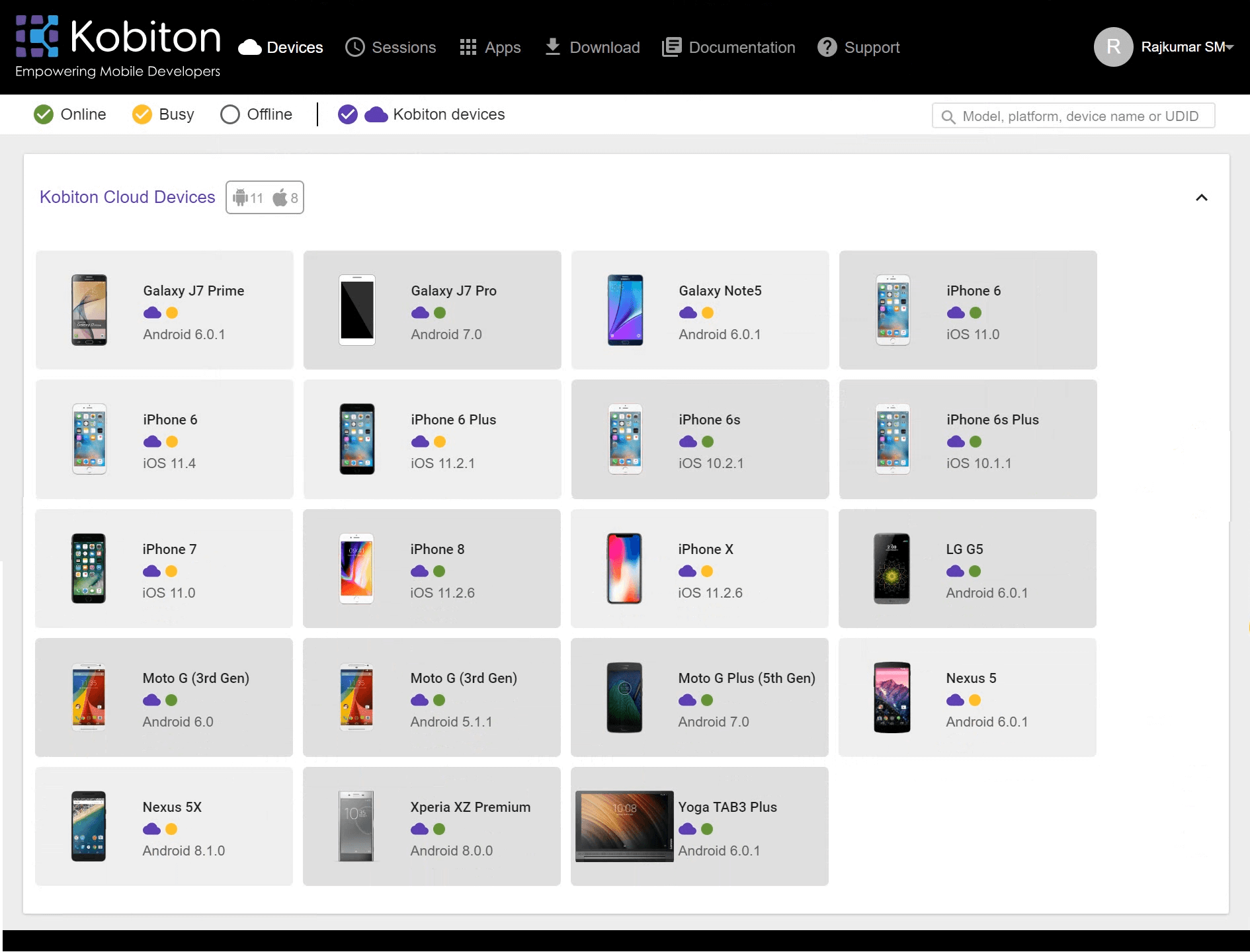
Setting Up Desired Capabilities
Hover over the device you want to test and select Show automation settings for Java language as below:
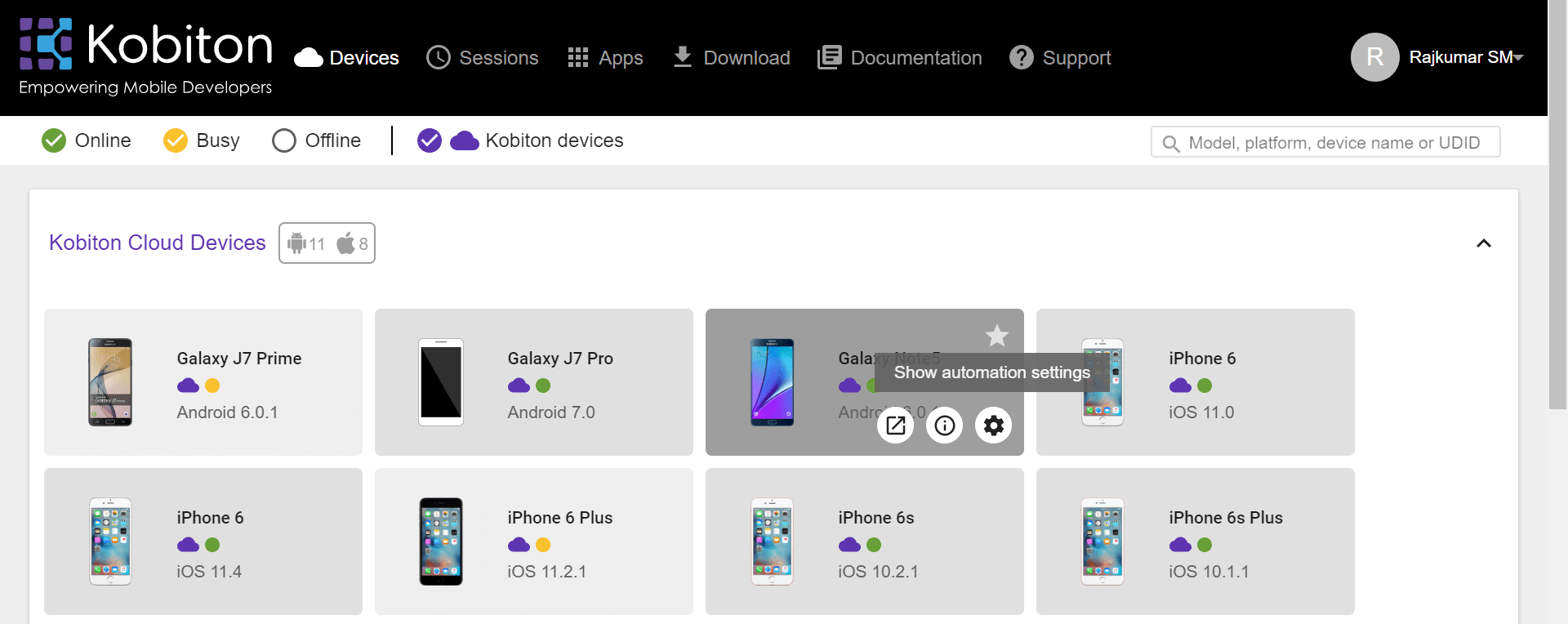
Desired Capabilities For Android device
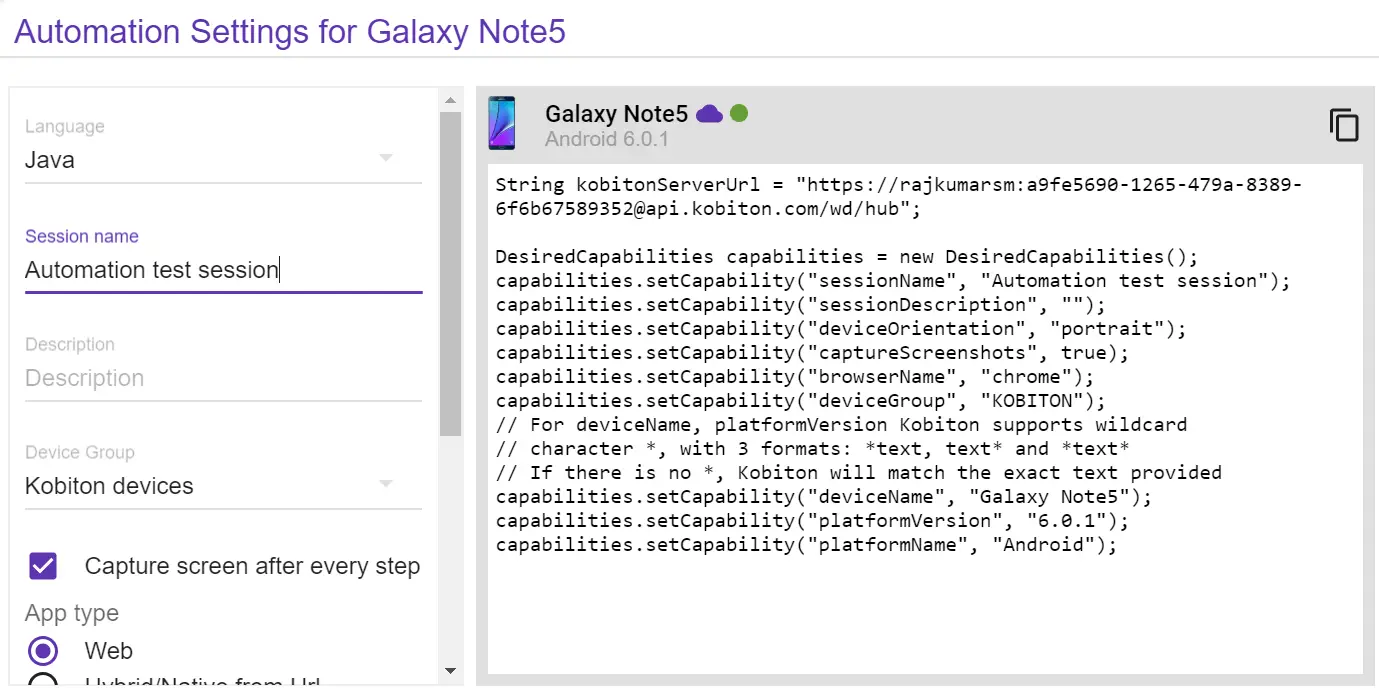
DesiredCapabilities capabilities = new DesiredCapabilities();
capabilities.setCapability("sessionName", "Automation test session on Android web");
capabilities.setCapability("sessionDescription", "This is example Android web testing");
capabilities.setCapability("deviceOrientation", "portrait");
capabilities.setCapability("captureScreenshots", true);
capabilities.setCapability("browserName", "chrome");
capabilities.setCapability("deviceGroup", "KOBITON");
capabilities.setCapability("deviceName", "Galaxy Note5");
capabilities.setCapability("platformVersion", "6.0.1");
capabilities.setCapability("platformName", "Android");
Desired Capabilities For iOS device
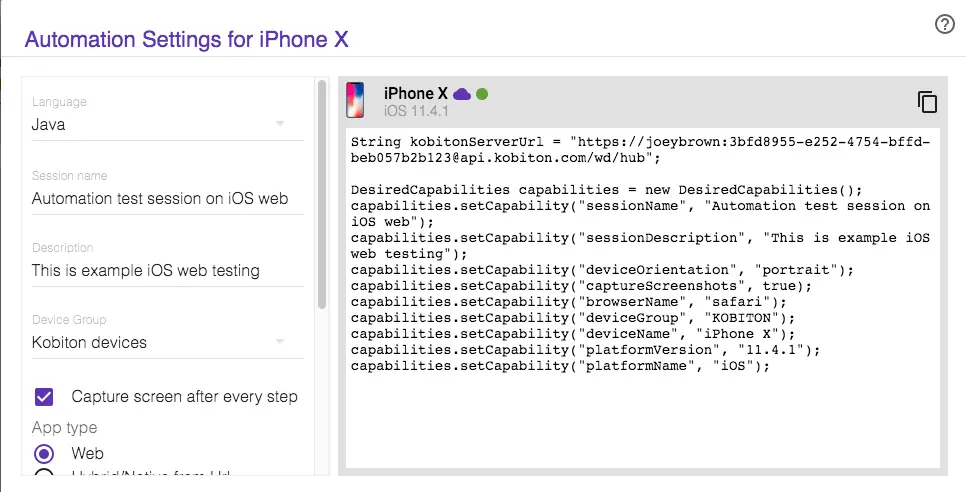
DesiredCapabilities capabilities = new DesiredCapabilities();
capabilities.setCapability("sessionName", "Automation test session on iOS web");
capabilities.setCapability("sessionDescription", "This is example iOS web testing");
capabilities.setCapability("deviceOrientation", "portrait");
capabilities.setCapability("captureScreenshots", true);
capabilities.setCapability("browserName", "safari");
capabilities.setCapability("deviceGroup", "KOBITON");
capabilities.setCapability("deviceName", "iPhone X");
capabilities.setCapability("platformVersion", "11.4.1");
capabilities.setCapability("platformName", "iOS");
Capture Screenshots
It allows skipping screenshots for each HTTP command or not. Depending on these screenshots, we can know the error or UI issue during running automation test. Please see the example:
capabilities.setCapability("captureScreenshots", true); // Or false
Portrait/Landscape
It’s possible to rotate the device before your test and you will have a different view of your website. Please see the example:
Rotate before test:
DesiredCapabilities capabilities = new DesiredCapabilities();
capabilities.setCapability("deviceOrientation", "portrait"); // Or "landscape"
Creating And Running A Mobile Browser Test
After all these steps have been done, let’s look at how to use WebDriver to get the test running. First, you need to initiate the WebDriver. Note that if you are using client-side execution this really may take some time as the device will be prepared for your session.
String kobitonServerUrl = "https://rajkumarsm:a9fe5690-1265-479a-8389-6f6b67589352@api.kobiton.com/wd/hub"; RemoteWebDriver driver = new RemoteWebDriver(new URL(kobitonServerUrl),capabilities);
Sample Program to Run Selenium Script on Android Device
This code example illustrates setting up a simple Java test to find the title of Appium page.
For Android device
import org.openqa.selenium.remote.DesiredCapabilities;
import org.openqa.selenium.remote.RemoteWebDriver;
import java.net.URL;
public class RemoteWebDriverAndroidTest {
public static void main(String[] args) throws Exception {
String kobitonServerUrl = "https://rajkumarsm:a9fe5690-1265-479a-8389-6f6b67589352@api.kobiton.com/wd/hub";
DesiredCapabilities capabilities = new DesiredCapabilities();
capabilities.setCapability("sessionName", "Automation test session on Android web");
capabilities.setCapability("sessionDescription", "This is example Android web testing");
capabilities.setCapability("deviceOrientation", "portrait");
capabilities.setCapability("captureScreenshots", true);
capabilities.setCapability("browserName", "chrome");
capabilities.setCapability("deviceGroup", "KOBITON");
capabilities.setCapability("deviceName", "Galaxy Note5");
capabilities.setCapability("platformVersion", "6.0.1");
capabilities.setCapability("platformName", "Android");
RemoteWebDriver driver = new RemoteWebDriver(new URL(kobitonServerUrl), capabilities);
/**
* Prints Kobiton Session Id
*/
String kobitonSessionId = driver.getCapabilities().getCapability("kobitonSessionId").toString();
System.out.println("Your test session is: https://portal.kobiton.com/sessions/" + kobitonSessionId);
driver.get("http://appium.io/");
/**
* Goes to Appium page and prints URL & title
*/
System.out.println("Current URL is: " + driver.getCurrentUrl());
System.out.println("Title of page is: " + driver.getTitle());
driver.quit();
}
}
Sample Program to Run Selenium Script on iOS Device
This code example illustrates setting up a simple Java test to find the title of Appium page.
For iOS device
import org.openqa.selenium.remote.DesiredCapabilities;
import org.openqa.selenium.remote.RemoteWebDriver;
import java.net.URL;
public class RemoteWebDriverIOSTest {
public static void main(String[] args) throws Exception {
String kobitonServerUrl = "https://rajkumarsm:a9fe5690-1265-479a-8389-6f6b67589352@api.kobiton.com/wd/hub";
DesiredCapabilities capabilities = new DesiredCapabilities();
capabilities.setCapability("sessionName", "Automation test session on iOS web");
capabilities.setCapability("sessionDescription", "This is example iOS web testing");
capabilities.setCapability("deviceOrientation", "portrait");
capabilities.setCapability("captureScreenshots", true);
capabilities.setCapability("browserName", "safari");
capabilities.setCapability("deviceGroup", "KOBITON");
capabilities.setCapability("deviceName", "iPhone X");
capabilities.setCapability("platformVersion", "11.4.1");
capabilities.setCapability("platformName", "iOS");
RemoteWebDriver driver = new RemoteWebDriver(new URL(kobitonServerUrl), capabilities);
/**
* Prints Kobiton Session Id
*/
String kobitonSessionId = driver.getCapabilities().getCapability("kobitonSessionId").toString();
System.out.println("Your test session is: https://portal.kobiton.com/sessions/" + kobitonSessionId);
driver.get("http://appium.io/");
System.out.println("Current URL is: " + driver.getCurrentUrl());
System.out.println("Title of page is: " + driver.getTitle());
/**
* Goes to Appium page and prints URL & title
*/
driver.quit();
}
}
Execute your Selenium Automation Script. You could find the result as mentioned below.
The result displays as below:

Kobiton Report
To check the status of your automation test, click on the sessions tab. Now you can check the status of your automation test.
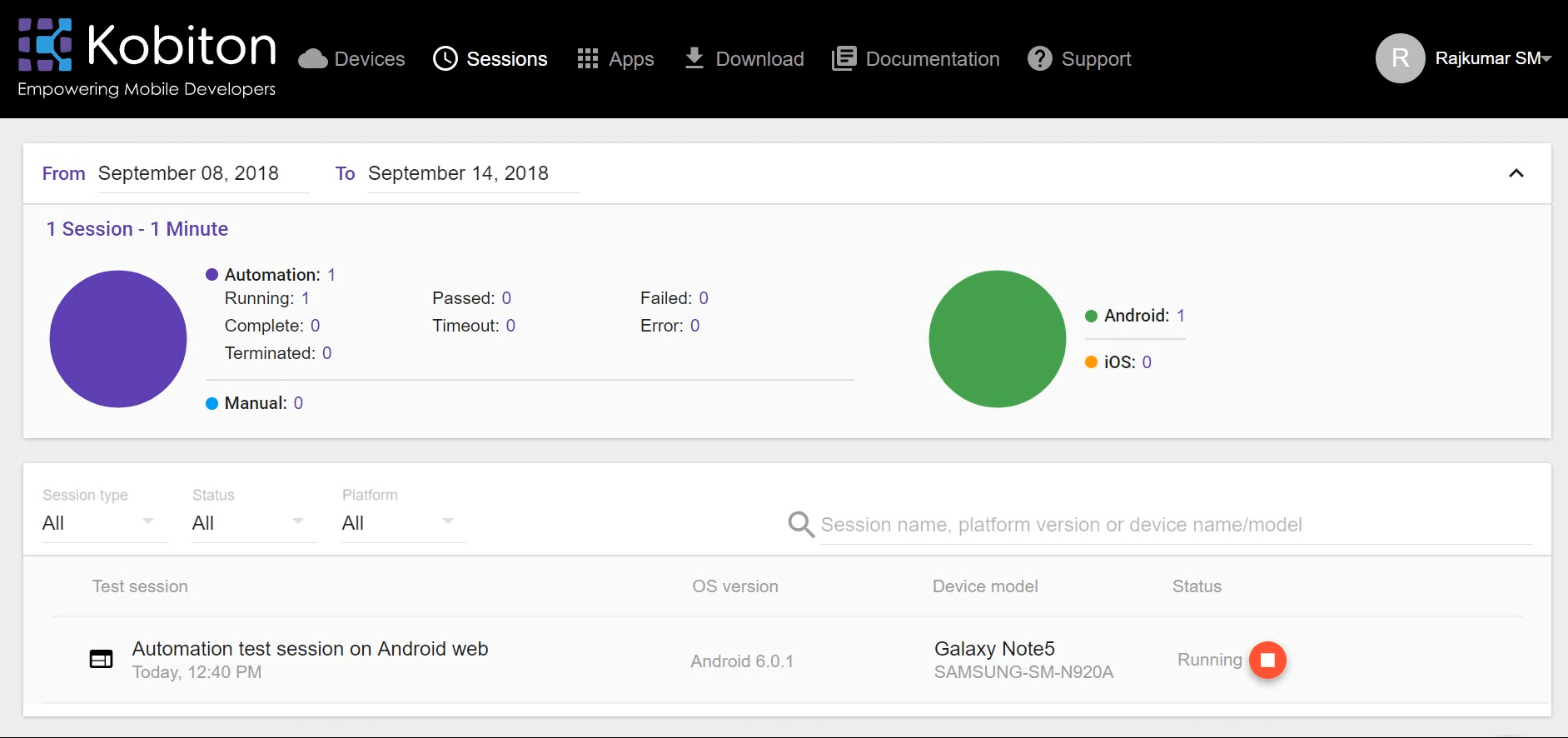
Conclusion
In summary, Kobiton is a powerful tool for mobile app testing. It offers access to real devices, a straightforward automation process, and integration with various development tools. With its ability to perform tests in real-world conditions and across multiple operating systems, it significantly enhances the accuracy of mobile app testing. While it addresses many common testing issues, it’s essential to evaluate if its features align with your specific needs. Overall, Kobiton is a highly beneficial platform for developers and QA professionals aiming to improve their mobile app testing efficiency.
If you already used Kobiton tool, share your experience by commenting below. If you never tried Kobiton then I highly recommend you to give it a try. Get your free trail of Kobiton Tool here.
FAQ
Who is a good fit for Kobiton?
Kobiton is ideal for development teams that focus on mobile app testing on real devices and need a reliable platform to test across multiple devices and operating systems. It’s especially suited for organizations that require integration with existing CI/CD pipelines and need robust automation capabilities. Companies looking for a flexible testing solution with strong customer support will also find Kobiton to be a good fit.
Who isn’t a good fit for Kobiton?
Kobiton might not be suitable for small teams with limited technical expertise or resources, as the initial complexity and learning curve can be challenging. Additionally, organizations that do not require extensive mobile testing across numerous devices and operating systems may find Kobiton’s robust feature set excessive and more expensive than necessary. Those who prioritize simplicity and immediate ease of use over advanced functionalities would also not be the best fit for this platform.
Which platforms are supported by Kobiton for testing?
Kobiton provides comprehensive support for mobile app testing on both iOS and Android platforms.
Is Kobiton capable of integrating with other tools?
Certainly, Kobiton seamlessly integrates with a range of CI/CD tools and provides an API for custom integrations.
Is real device testing available with Kobiton?
One of Kobiton’s standout features is its ability to conduct tests on real mobile devices.
Does Kobiton offer a free trial?
Kobiton provides a free trial, enabling users to explore its features before committing to a subscription.
Is Kobiton suitable for Automated Testing?
Yes, Kobiton is suitable for automated test execution.
What are the available alternatives to Kobiton?
Some of the Kobiton alternatives are Perfecto, BrowserStack Automate, TestGrid, SauceLabs, etc.,




